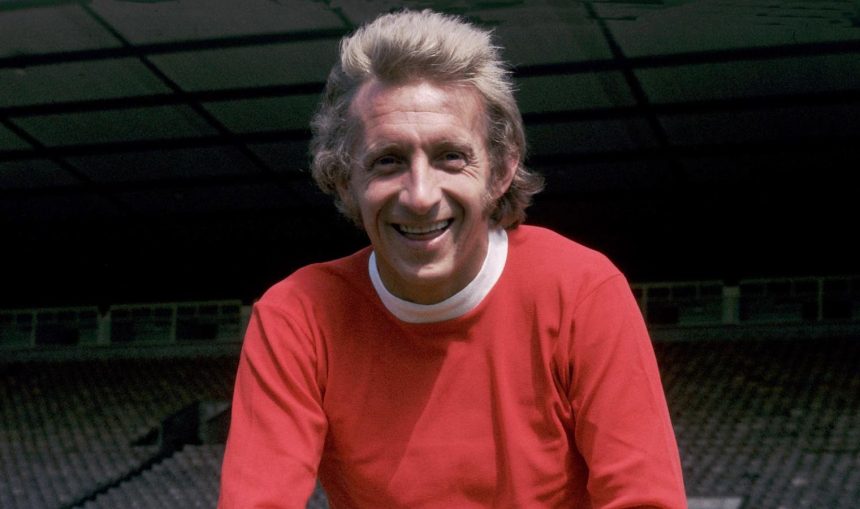Denis Law, a name synonymous with Manchester United’s attacking prowess, etched his legacy as one of the club’s greatest strikers, despite his personal preference for a more involved, midfield role. His initial desire to orchestrate play as an inside-forward was superseded by Sir Matt Busby’s directive to focus solely on scoring goals, a command Law followed to devastating effect. Transforming into a prolific goalscorer, he amassed 236 goals in 393 appearances for United, securing his place in the pantheon of Old Trafford legends. His impact transcended mere statistics, embodies in the two statues that immortalize him at the Theatre of Dreams: one alongside Charlton and Best, the other a towering solo tribute, capturing his characteristic celebratory pose. Law’s legacy isn’t just about numbers; it’s about the electricity he brought to the pitch, the raw energy that captivated fans and made him the original King of the Stretford End.
Law’s journey to Old Trafford began in humble circumstances. Growing up in post-war poverty, sharing a bed with siblings and wearing hand-me-down clothes, instilled in him a gritty determination. His footballing journey took him from Huddersfield to Manchester City and even a stint in Italy with Torino before he finally landed at Manchester United in 1962 for a then-British record fee. His arrival ignited a spark in the team, injecting confidence and a renewed sense of purpose. Law’s immediate impact, scoring on his debut, signaled the beginning of a prolific era. His goalscoring prowess, netting 29 times in his first season, culminated in an FA Cup triumph, United’s first major trophy since the Munich Air Disaster.
The following seasons witnessed Law’s ascendance to footballing royalty. His remarkable 46 goals in the 1963-64 season earned him the prestigious Ballon d’Or, making him the first Scottish player to achieve this honor. He continued his goal-scoring exploits, helping United reclaim the league title in 1965. The “Holy Trinity” of Best, Law, and Charlton unleashed a period of dominance, capturing another league title in 1967, with Law contributing a significant 25 goals. However, fate dealt a cruel blow. Injury forced him to miss United’s historic European Cup victory in 1968, a moment of triumph he could only witness from a hospital bed, a memory tinged with bittersweet emotion.
The relentless physical demands of the game and the brutal nature of defending in that era began to take their toll on Law. A severe knee injury marked a turning point in his career, leaving him with persistent pain and diminishing his explosive speed and agility. Despite his unwavering spirit, the goals came less frequently, and his performances, though still marked by his trademark tenacity, lacked the same electrifying brilliance. The twilight of his United career ended unceremoniously. He learned of his release through a television report, a stark contrast to the adulation he had once commanded.
In a twist of fate, Law joined crosstown rivals Manchester City. A cruel irony awaited him. In the penultimate game of the 1973-74 season, he faced his beloved Manchester United, a team teetering on the brink of relegation. With the score tied, Law instinctively back-heeled the ball into the net, securing a victory for City and seemingly sealing United’s relegation. Despite the fact United’s fate was already sealed regardless of the outcome of the match, the goal became etched in footballing folklore as the moment Law relegated his former club. The image of the returning hero, distraught at having seemingly condemned his former team, remains a potent symbol of football’s capricious nature.
For Law, the goal was a source of profound sadness, a stark contrast to the joy he usually derived from scoring. It was a memory he rarely discussed, preferring to avoid the painful recollection. While he acknowledged the significance of the moment, he emphasized that United’s relegation was inevitable, regardless of the outcome of that particular game. He maintained that he never dwelt on the incident, preferring to focus on the positive memories of his illustrious career. In the latter years of his life, when he returned to Old Trafford, his gaze would invariably be drawn to the statue that immortalized him alongside Best and Charlton, a symbol of a golden era for Manchester United, a time when Denis Law, the reluctant goalscorer, reigned supreme.
The latter years of Law’s life were marked by his ongoing struggle with the legacy of that fateful back-heeled goal. Despite his insistence that United were already destined for relegation, the image remained etched in the public consciousness. However, for Law, it was the joy of playing, the electrifying energy he brought to the field and the sheer volume of goals he scored for Manchester United that truly defined his career, overshadowing the unfortunate incident that has often been used to characterize his final years at Old Trafford. The statues, the records, the memories of his dynamic play – these are the enduring legacies of Denis Law, the King of the Stretford End, a player who, despite his initial reluctance, embraced the role of goalscorer and became a true Manchester United legend.



